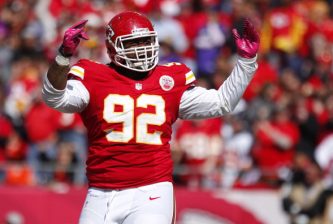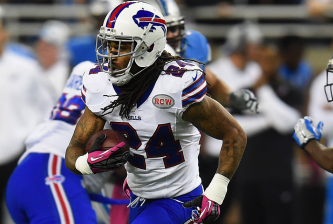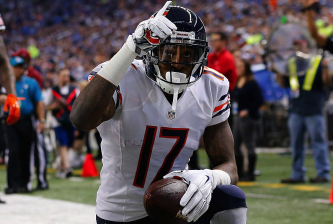Thursday, April 16 is the home opener for the Asheville Tourists. It might be one of the busiest times of year in the team’s souvenir shop, especially coming off a South Atlantic League championship last season. Other than championship apparel, however, a popular item at The Tourists Trap is a No. 3 t-shirt jersey with “Wilson” on the back.
The Tourists, the Class A minor-league affiliate of the Colorado Rockies, are more than happy to remind everyone that Russell Wilson played baseball for them in 2011 and capitalize on that association. Four years later, after a phenomenal run of success at Wisconsin and with the Seattle Seahawks that includes a Super Bowl title, Wilson apparently isn’t ready to give up the dream of playing baseball either.
“You never want to kill the dream of playing two sports,” the Seahawks quarterback told Bryant Gumbel in an interview for HBO’s Real Sports that will air on April 21. “I would honestly play two sports.”
Gumbel followed up by asking what’s stopping him, to which Wilson responded, “I don’t know. I may push the envelope a little bit one of these days.”
For the second consecutive year, Wilson participated in one day of spring training workouts with the Texas Rangers, who picked him up in MLB’s Rule 5 Draft in 2013. He was made available when the Rockies decided not to include him on their 40-man roster. Colorado didn’t see the point in using a spot for Wilson when football seemed to be his future. The Rangers felt a bit differently, believing he could at least provide valuable tutelage and inspiration to their minor leaguers in the spring.
But is baseball at all a future possibility for Wilson, if it’s something he’d truly like to pursue — either as an alternative to football or a second athletic career as he approaches his thirties?
Skeptics immediately point to the .228 batting average and .708 OPS (On-base Plus Slugging percentage) Wilson compiled in his half-season with the Rockies organization before opting out of baseball to play at Wisconsin. Those are numbers that probably mean a repeat performance at the Single-A level, and not necessarily a fast track to the big leagues.
But as an Asheville resident and someone who covered the team, I can tell you that Wilson was getting better. He was working hard to improve his swing, putting in hours of work to the point of nearly alienating teammates. And the repetitions were paying off. If you look at his month-by-month splits, he hit .271 in June with an .816 OPS, two home runs, nine RBI and four stolen bases.
Combine that with natural athleticism that provided base-stealing speed and good defense at second base, and you see why Wilson was still considered to have potential. Determination and athleticism are two of the traits that carried him to success in the NFL. Could Wilson have made it to the major leagues had he stuck with baseball? His minor league manager, Joe Mikulik, thought so.
However, Wilson was 22 then. That’s about the right age for players at the Single-A level, typically playing their first full season of professional baseball after high school or college. Wilson is 26 now, old for the lower minor leagues. If he was two to three years (and maybe four) from advancing to the majors before, where would he be after taking essentially five years away from the sport?

:SURPRISE, AZ – MARCH 03: Russell Wilson #3 of the Texas Rangers runs through some infield drills during a work out before the game against the Cleveland Indians at Surprise Stadium on March 03, 2014 in Surprise, Arizona. (Photo by Mike McGinnis/Getty Images)
That’s not to say that Wilson couldn’t be a 30-year-old playing minor league baseball. The minors are full of players like that. Maybe Wilson really would be playing for love of the game, after having made money and found success in the NFL. Baseball could be his way of staying in shape, taking less of a pounding on his body, sharing the camaraderie of a locker room with teammates and getting paid (even by minor league standards) to play a game. There are many worse ways to live.
But Wilson said he wanted to play two sports, indicating he envisions being able to toggle between pro football and baseball in a given year (and presumably years to come). Of course, it’s not unprecedented. Bo Jackson played for the Los Angeles Raiders and Kansas City Royals during a four-year span. Deion Sanders juggled careers between the NFL and MLB for 12 seasons. Brian Jordan played both sports, but not at the same time. Brian Jordan was a safety for the Atlanta Falcons while playing in the St. Louis Cardinals organization.
Yet neither Jackson, Sanders nor Jordan played quarterback, a position that requires much more study and repetition than a running back or defensive back. That’s not to say those other players didn’t have to prepare in terms of learning schemes, opposing players and so forth. But it was arguably easier for them to put on the pads and let their natural athletic gifts take over. RB and DB prospects are not sitting down with Jon Gruden to watch tape, draw up formations and plays on a whiteboard, and review terminology and play calls. Much more comes with and is expected of the quarterback position.
There could also be another factor behind Wilson expressing interest in playing another sport. As the Seattle Times‘ Bob Condotta and others point out, Wilson’s contract with the Seahawks expires after this season. Considering his status as a starting NFL quarterback and what he’s achieved in his first three seasons, he’s been woefully underpaid with a contract that will total $3 million. Wilson will certainly try to make up for that with his next deal and get the money that someone of his stature already should have.
But if the Seahawks and any other NFL team are hesitant to meet his price, Wilson might be using baseball as leverage. Is that a realistic threat when he can make so much more money in football at this point of his career than he likely would in baseball, especially if he never makes it to the majors? Probably not. And if Wilson is serious about playing baseball, would a NFL team really be interested in giving him the $100 million contract for which he’s presumably in line? That doesn’t seem likely.
However, if Wilson pushes the envelope, as he put it, maybe it shows that he really does intend to pursue playing a different sport, one which presents a greater challenge for him than the NFL might. After all, he’s already reached the heights of success for a quarterback. Someone who seems to thrive on pushing himself and asserting his will over an athletic endeavor could really have an itch to scratch. It’s up to the Seahawks to make that itch go away with a large contract extension and keep baseball as a hobby for Wilson.




